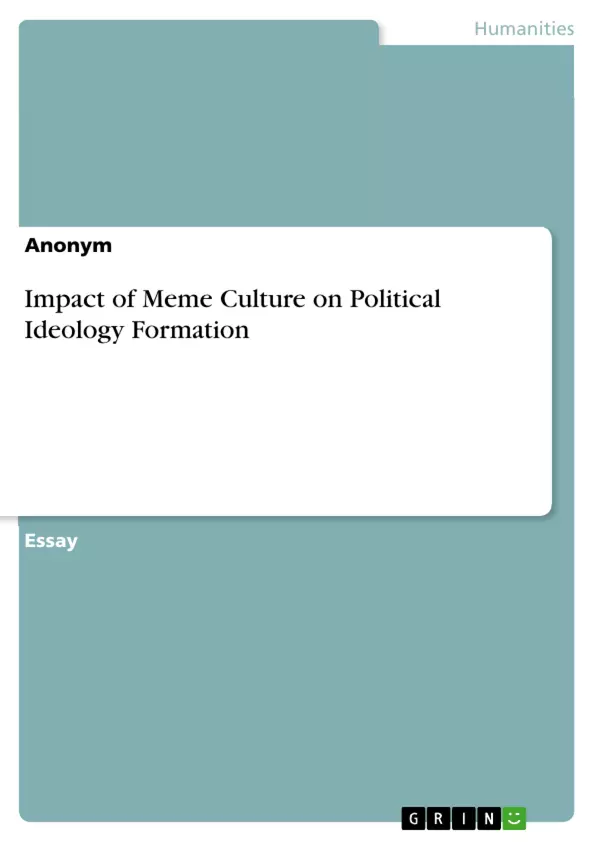Meme culture has become the essence of modern communication, especially as far as political campaigns are concerned. In this age of social media, memes seem to depict not only entertainment but also a tool for the promotion of opinion and influencing political ideologies. The paper explores the complex function of meme culture in the creation of political ideology, discussing how it impacts various populations, how memes cognitively influence beliefs on politics, and what the implications may be for democracy. An attempt through this paper is made to represent the transformation of political engagement and ideological alignment in the digital age with a literature review, case studies, and theoretical exploration.
Inhaltsverzeichnis (Table of Contents)
- Introduction
- Defining Meme Culture in the Political Context
- Cognitive Mechanisms of Meme Influence
- Simplification of Complex Ideas
- Emotional Engagement
- Reinforcement of Cognitive Biases
- Meme Culture as a Tool for Political Mobilization
- The Role of Memes in Election Campaigns
- Meme-Based Political Movements
- Memes as a Weapon of Disinformation
- Demographic Analysis: Memes and Ideological Groups
- Youth Engagement with Political Memes
- Memes in Polarized Political Environments
Zielsetzung und Themenschwerpunkte (Objectives and Key Themes)
This paper explores the multifaceted role of meme culture in shaping political ideology. It investigates how memes impact different demographics, analyze the cognitive mechanisms through which memes influence political beliefs, and examines the implications for democracy in the digital age. The study utilizes a literature review, case studies, and theoretical exploration to understand the transformation of political engagement and ideological alignment in the context of social media.
- The influence of meme culture on political ideology formation.
- Cognitive mechanisms by which memes shape political beliefs (simplification, emotional engagement, reinforcement of biases).
- The role of memes in political mobilization and the spread of disinformation.
- Demographic analysis focusing on youth engagement and the impact of memes in polarized environments.
- The implications of meme culture for democratic processes.
Zusammenfassung der Kapitel (Chapter Summaries)
Introduction: Introduces the topic of meme culture's impact on political ideology formation, highlighting the increasing prevalence and influence of memes in political communication, particularly among young people. It poses key questions regarding the shaping of political beliefs through memes.
Defining Meme Culture in the Political Context: Defines internet memes and their functions within the political sphere, categorizing them into political satire, partisan, and identity memes. It discusses how memes simplify complex political issues into easily shareable content.
Cognitive Mechanisms of Meme Influence: Explores how memes influence political ideology through simplification of complex ideas, emotional engagement, and reinforcement of cognitive biases. It references the Affective Intelligence Theory.
Meme Culture as a Tool for Political Mobilization: Examines the use of memes in election campaigns and grassroots political movements, providing examples such as the 2016 U.S. Presidential election and the alt-right and Black Lives Matter movements. It also addresses the use of memes to spread misinformation.
Demographic Analysis: Memes and Ideological Groups: Analyzes the engagement of youth with political memes and the role of memes in polarized political environments, highlighting the ideological battles that unfold in meme creation.
Schlüsselwörter (Keywords)
Meme culture, political ideology, social media, political communication, cognitive biases, political mobilization, disinformation, youth engagement, polarized environments, digital age.
- Quote paper
- Anonym (Author), 2024, Impact of Meme Culture on Political Ideology Formation, Munich, GRIN Verlag, https://www.grin.com/document/1507060



